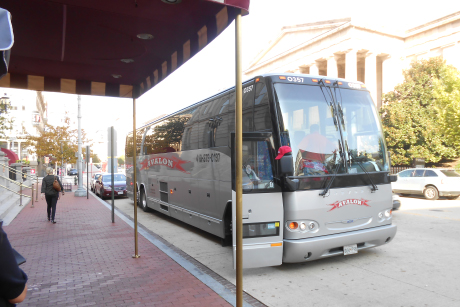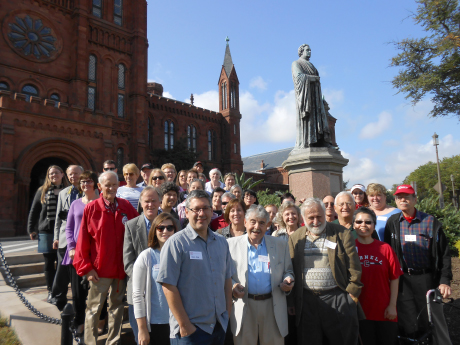Cornellians explore sites of Ezra's entrepreneurship
By Kathleen Corcoran


About 50 alumni and friends of the university toured historic sites in the Washington, D.C., area to hear stories of Ezra Cornell’s path to founding an Ivy League university in Ithaca, New York.
Cornell studied works on electricity and magnetism in the United States Patent and Trademark Office Office library and the Library of Congress in Washington, D.C., before becoming an assistant to Samuel Morse, playing a vital role in the invention of the telegraph, according to documents in the Cornell University Library’s Division of Rare and Manuscript Collections. In 1844, Cornell connected the first telegraph line between the Supreme Court chamber of the U.S. Capitol building and the railroad station in Baltimore.
Robert Day ’56 wanted fellow Cornellians to experience this lesser-known part of Ezra Cornell’s history. An active member of the Cornell Club of Washington, Day organized a Sept. 20 bus tour of Cornell’s achievements in the greater Washington area in honor of the university’s sesquicentennial.
Starting at 9 a.m. in downtown D.C., the bus tour stopped at the Smithsonian Institution, where alums sang the Cornell alma mater. The bus then followed the route on which Ezra laid the telegraph, starting at the Capitol and proceeding into Maryland along the B&O Railway’s right-of-way. It was along these telegraph lines Samuel Morse sent his historic 1844 message, “What hath God wrought?”
Other stops included the Berwyn Heights pedestrian bridge to view the still-active B&O tracks near Ezra Cornell’s telegraph line. The tour’s last stop was the Hornblake Library at the University of Maryland, which included a briefing on the education reform efforts that led to the Morrill Land Grant Act of 1862.
Tour participant Linda Jarschauer Johnson ’60, former executive director of the Cornell in Washington program, said: “How remarkable Ezra Cornell was in his entrepreneurial spirit. He gave that quality to the university. … Ezra’s spirit lives on through Cornell.”
Kathleen Corcoran is a Cornell public affairs officer in Washington, D.C.
Media Contact
Get Cornell news delivered right to your inbox.
Subscribe